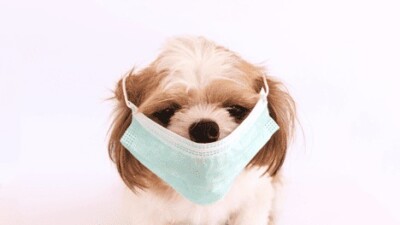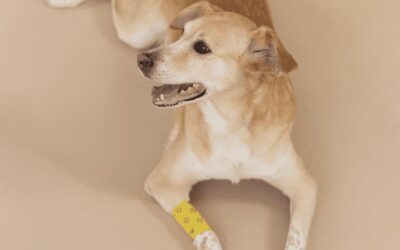Kennel Cough Cause, Symptoms & Treatment Options

Updated November 14, 2025
If you’ve ever heard your dog making a loud, honking cough that sounds like they have something stuck in their throat, you’re probably dealing with kennel cough. While it can sound alarming, we want to reassure you that most cases are mild and treatable. Understanding what causes kennel cough, recognizing the symptoms, and knowing your treatment options can help you keep your furry friend comfortable while they recover.
Let’s walk through everything you need to know about this common respiratory infection.
What Is Kennel Cough?
Kennel cough, also known as canine infectious respiratory disease (CIRD) or canine infectious tracheobronchitis, is a highly contagious upper respiratory infection in dogs. Think of it like the common cold in humans—it’s uncomfortable and annoying, but usually not dangerous.
The infection affects your dog’s respiratory tract, including their windpipe (trachea), voice box (larynx), and lungs. Although it may sound alarming, most healthy adult dogs recover completely within one to three weeks without any serious complications.
Causes of Kennel Cough
Just like human colds can be caused by multiple viruses, kennel cough isn’t caused by just one organism. It’s actually a combination of bacteria and viruses working together to create the perfect storm for respiratory infection.
The most common culprit is a bacterium called Bordetella bronchiseptica. You might even hear veterinarians refer to kennel cough as simply “Bordetella.” However, several other organisms can contribute to or cause the infection, including:
- Canine parainfluenza virus
- Canine adenovirus type 2
- Canine distemper virus
- Canine herpesvirus
- Canine influenza virus
- Canine respiratory coronavirus
- Mycoplasma species
Most dogs with kennel cough are actually infected with a combination of these organisms at the same time, which is why the symptoms can vary from dog to dog.
How Does Kennel Cough Spread?
Kennel cough is incredibly contagious and spreads through several routes. Your dog can contract it through:
- Airborne droplets: When an infected dog coughs or sneezes, they release tiny droplets into the air that other dogs can breathe in.
- Direct contact: Dogs touching noses, licking each other, or playing together can pass the infection along.
- Contaminated surfaces: Shared water bowls, food dishes, toys, and even bedding can harbor bacteria and viruses.
As the name suggests, kennel cough spreads rapidly in places where dogs are in close quarters, such as boarding kennels, doggy daycare facilities, grooming salons, dog parks, training classes, and dog shows.
Recognizing the Symptoms of Kennel Cough
The hallmark symptom of kennel cough is unmistakable once you’ve heard it. We’re talking about that distinctive dry, hacking cough that sounds like a goose honking or like your dog is trying to clear something from their throat.
Common Symptoms Include:
- The characteristic honking cough: This is the most obvious sign. The cough is typically forceful and persistent, and it may sound like your dog is gagging or trying to cough up something.
- Coughing fits after excitement or exercise: You might notice the cough worsens when your dog gets excited, exercises, or when pressure is applied to their throat (like from a collar).
- Sneezing and runny nose: Some dogs develop cold-like symptoms, including nasal discharge and sneezing.
- Eye discharge: Watery eyes or mild discharge can accompany the respiratory symptoms.
- Retching or gagging: After coughing, your dog might gag or produce a small amount of white, foamy mucus.
Important Signs Your Dog Is Still Doing Okay:
Despite the alarming cough, most dogs with kennel cough maintain their normal appetite and energy levels. They’ll still want to eat, play, and go about their usual routine. This is actually a good sign that the infection is mild and uncomplicated.
When to Worry:
While kennel cough is usually mild, certain symptoms require immediate veterinary attention. Contact your vet right away if your dog shows:
- Rapid or labored breathing
- Lethargy or extreme tiredness
- Loss of appetite
- High fever
- Thick, green, or yellow nasal discharge
- Productive cough with colored mucus
These symptoms could indicate that the infection has progressed to pneumonia or that your dog has a more serious respiratory condition. Puppies, senior dogs, and dogs with compromised immune systems or pre-existing health conditions are at higher risk for complications.
Treatment Options for Kennel Cough
The good news is that most cases of kennel cough resolve on their own without the need for medical intervention. However, treatment can help your dog feel more comfortable and prevent complications.
Supportive Care at Home
For mild cases, your veterinarian may recommend letting the infection run its course with supportive care:
- Rest: Limit exercise and excitement, which can trigger coughing fits. Your dog needs time to heal, just like you would with a cold.
- Isolation: Keep your dog away from other dogs for at least two weeks after symptoms resolve to prevent the spread of the infection.
- Humidifier or Steam Therapy: Use a humidifier in the room where your dog spends time, or bring them into a steamy bathroom for 10-15 minutes a few times a day. The moisture helps soothe irritated airways.
- Switch to a Harness: Use a body harness instead of a neck collar during walks to avoid putting pressure on your dog’s trachea, which can trigger coughing.
- Soft Foods: Offer canned food or softened kibble if your dog’s throat is sore and they’re having trouble swallowing.
- Avoid Irritants: Keep your dog away from cigarette smoke, harsh cleaning products, and other substances that can irritate the respiratory system.
Medications
Depending on the severity of your dog’s symptoms, your veterinarian may prescribe medications:
- Cough Suppressants: These help reduce the frequency and intensity of coughing, allowing your dog to rest better. Common options include hydrocodone or butorphanol. Note that cough suppressants should not be used if pneumonia is suspected.
- Antibiotics: If there’s evidence of a bacterial infection or risk of secondary bacterial complications, your vet may prescribe antibiotics.
- Anti-inflammatory Medications: In some cases, anti-inflammatory drugs may be prescribed to reduce airway inflammation.
Treatment Costs
According to Bestie Paws Hospital, a veterinary facility, the cost of kennel cough treatment typically ranges from $50 to $200 for the initial veterinary consultation and medications. They note that medicines, including antibiotics and cough suppressants, typically cost between $30 and $150.
If your dog requires more extensive diagnostic testing, such as X-rays or laboratory work, the cost could increase by an additional $50 to $200. More severe cases may require hospitalization, potentially incurring costs of $200 to $500 or more.
It’s worth noting that prevention through vaccination is much more cost-effective than treating an active infection.
Preventing Kennel Cough
While you can’t completely eliminate your dog’s risk of contracting kennel cough, vaccination significantly reduces the likelihood and severity of infection.
Vaccination Options
There are three forms of the Bordetella vaccine available:
- Injectable Vaccine: Given as a shot, typically in combination with other vaccines. This is the most common method.
- Intranasal Vaccine: Administered as nose drops. This method provides faster immunity (within 48-72 hours) and may offer better protection against Bordetella specifically.
- Oral Vaccine: Given by mouth. This is the newest form and works similarly to the intranasal vaccine.
According to Chewy’s veterinary experts, dog vaccines typically range from $15 to $100 per vaccine, depending on the specific shot and your location. Your veterinarian can recommend the best form for your dog based on their lifestyle, age, and health status.
Vaccination Schedule
Puppies can start receiving the Bordetella vaccine as early as six to eight weeks of age. After the initial vaccine, boosters are typically given:
- Annually for most dogs
- Every six months for dogs at high risk (those who frequently board, attend daycare, or visit dog parks)
Many boarding facilities, doggy daycares, and training classes require proof of current Bordetella vaccination before allowing your dog to participate. Some facilities require the vaccine to be administered at least one to two weeks before arrival to ensure immunity has developed.
Other Preventive Measures
Beyond vaccination, you can take additional steps to reduce your dog’s risk:
- Choose boarding facilities and daycares with good ventilation and hygiene practices
- Ensure that facilities require vaccination proof for all dogs
- Avoid overcrowded dog parks during outbreaks
- Keep your dog’s overall immune system strong with proper nutrition, exercise, and regular veterinary care
- Watch for symptoms in dogs your pet interacts with, and avoid contact if they’re coughing
What Does Odie Pet Insurance Cover?
Pet insurance covers various veterinary expenses, providing financial protection and peace of mind for pet owners. Here are the details of the coverage options offered by Odie Pet Insurance:
Illness & Injury Plan
The Illness & Injury Plan is an all-inclusive insurance plan designed to cover a wide range of medical needs for your pet. This plan includes comprehensive coverage for various illnesses, injuries, and veterinary services. Some of the covered items include:
- Veterinary exams and consultations
- Diagnostics (e.g., X-rays, lab tests)
- Prescribed medications
- Surgeries and hospitalization
- Rehabilitation, acupuncture, or chiropractic treatments
- Medically necessary supplies
- Euthanasia and cremation
The Wellness Plan
The Wellness Plan is a monthly membership that focuses on preventive care and covers routine veterinary services.
- Provides reimbursements for routine care items such as wellness visits (exams and vaccines), testing and parasite prevention, dental cleanings and at-home dental care, vitamins, supplements, and more
- Through Odie’s partnership with Petivity, a leader in smart pet products and proactive care, Wellness Plan members can also receive reimbursements for Petivity devices and health kits, as well as eligible Purina food and supplements.
- Total reimbursement up to $700 per year.
Conclusion
Kennel cough is a regular respiratory illness that affects dogs, especially those in crowded environments. Kennel cough’s classic symptom is a gagging or honking type of cough. Healthy dogs usually recover from kennel cough within a couple of weeks, but puppies and seniors with pre-existing conditions may develop more severe illnesses, such as pneumonia. Prevent your dog from contracting kennel cough with regular vaccinations. Although not 100% effective in preventing kennel cough, vaccinated dogs recover quickly and have fewer complications. Pet insurance helps offset the costs of diagnosing, treating, and vaccinating your dog against kennel cough.
FAQs:
What is kennel cough, and what causes it?
Kennel cough (Canine Infectious Respiratory Disease Complex/CIRDC) is a highly contagious respiratory illness causing a characteristic hacking, gagging cough. Caused by bacteria and viruses: Bordetella bronchiseptica (the most common bacteria), Canine Parainfluenza (CPIV), Canine adenovirus (CAV-2), and Canine distemper. The disease spreads through airborne droplets when infected dogs cough, direct contact, contaminated bowls/toys, and shared environments (such as boarding, shelters, daycare, dog parks, training classes, and grooming).
What are the symptoms, and when should I be concerned?
- Main symptom: Distinctive honking, gagging cough. Dogs often look completely healthy otherwise. Other symptoms: dry, hacking cough (resembling a goose honk sound), retching/gagging, runny nose, sneezing, eye discharge, normal appetite/energy.
- Contact a vet immediately for: lethargy, loss of appetite, fever, difficulty/rapid breathing, and green/yellow nasal discharge—this may indicate pneumonia, especially in puppies and seniors. Symptoms appear 2-14 days after exposure.
How is kennel cough treated, and how long does it last?
- Mild cases: Resolve on their own in 1-3 weeks (up to 6 weeks in older dogs) with rest, avoiding excitement, keeping away from other dogs, using a harness instead of a collar.
- Severe cases: The vet may prescribe antibiotics (to prevent secondary infections), cough suppressants, and anti-inflammatory medications. Usually sick 1-2 weeks, but remain contagious 2-3 months after infection. Most healthy adults recover completely.
Can kennel cough be prevented, and who needs the vaccine?
You can’t completely prevent it, but you can reduce the risk through vaccination (which can be injectable, intranasal, or oral). The vaccine is administered in two doses, given 2 to 4 weeks apart, followed by a booster every 6 months to 1 year. While it doesn’t guarantee 100% protection (as multiple pathogens can cause the illness), it does help reduce the severity of the disease. Vaccination is recommended for dogs that are frequently boarded, attend daycare, compete in sports, or are exposed to other dogs. Many facilities require proof of vaccination..
Which dogs are most at risk?
Puppies (mainly under 6 months), seniors, dogs with weakened immune systems/pre-existing conditions, dogs in crowded environments (kennels, shelters, daycare, parks), stressed dogs, and those exposed to poor ventilation/smoke/cold. Brachycephalic breeds (Bulldogs, Pugs) may have more severe symptoms.
Common exposure locations include boarding, daycare, parks, training, shows, grooming, shelters, and vet hospitals.
Is kennel cough contagious, and does insurance cover treatment?
Highly contagious to other dogs. Keep the infected dog isolated until symptoms appear, and then continue isolation for at least 2 weeks after the symptoms disappear. If multiple dogs are in the household, all are likely to be exposed—monitor them closely. It is extremely rare for humans to catch this condition (only those with weakened immune systems). Pet insurance plans, such as Odie’s comprehensive accident/illness coverage, typically cover treatment, including veterinary exams, diagnostics, medications, and follow-ups.



